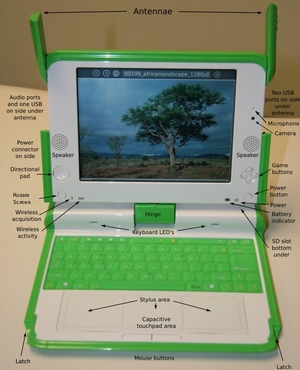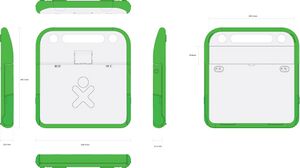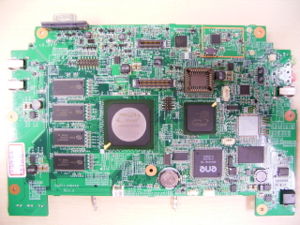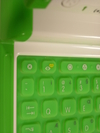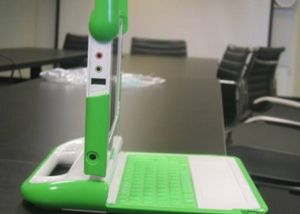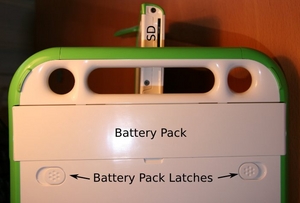Hardware specification/lang-ja
| 翻訳された Hardware specification | 原文 |
| deutsch | english | español | français | italian | 日本語 | 한글 | português | русский indonesia +/- | 変更 |
- This is an on-going translation
ラップトップ ハードウェア
XOラップトップはOne Laptop Per Childの中心となるものです。3年に渡る開発の後に量産が始まりつつあり、数千のベータテスト(B2)装置が開発者によって使われ、参加国の学校でテストされています。技術の進歩に追従するためにラップトップの設計の最終的な小変更が行われました。
The XO laptop is the center of One Laptop Per Child. After three years of development, it is approaching mass production, with several thousand Beta test (B2) units deployed to developers and for testing in schools in participating countries. The laptop design has just undergone a final minor update to keep up with advancements in technology.
仕様
正式なラップトップの仕様はPDFでのみ提供されます。このページはできる限り正確にその情報を反映するようにします。
The definitive laptop specification is only available in PDF format. This page attempts to accurately reflect that information.
寸法
- おおよその寸法: 242mm × 228mm × 30mm (詳細な寸法は右の図面を見てください)
- おおよその重量:
- LiFePバッテリ付のXO: 1.45kg (~3.20lbs);
- NiMHバッテリ付のXO: 1.58kg (~3.48lbs);
- 構成: 回転軸付きコンバーチブル・ラップトップ、反転可能なディスプレイ、防塵および防滴筐体、ファンなし
- Approximate dimensions: 242mm × 228mm × 32mm (see drawing to the right for detailed dimensions)
- Approximate weight:
- XO laptop with LiFeP battery: 1.45KG (~3.20lbs);
- XO laptop with NiMH battery: 1.58KG (~3.48lbs);
- Configuration: Convertible laptop with pivoting, reversible display; dirt- and moisture-resistant system enclosure; no fan.
核となる電子部品
- CPU: x86互換プロセッサ、64KBのL1とIおよびDキャッシュ、最低128KBのL2キャッシュ
- CPUクロックスピード: 433 MHz;
- ISA互換: MMXと3DNow!のx86拡張命令セットをサポート;
- Athlon命令セット(MMXと3DNow!拡張を含む)に加えてGeode専用命令セット
- 周辺チップ: CPUに統合されたPCIとメモリインタフェース
- ノースブリッジ: Geode CPUに統合されたPCIとメモリインタフェース(情報)
- サウスブリッジ: AMD CS5536 (データシート)
- グラフィックコントローラ: CPUに統合、統合メモリアーキテクチャ
- 組込コントローラ: ENE KB3700またはENE KB3700B
- DRAMメモリ: 256 MB ダイナミックRAM、データレート: デュアルDDR333-166MHz
- BIOS: 1024KB SPIインタフェース フラッシュROM
- オペレーティングシステムをロードするためのOpen Firmware
- 大容量記憶装置: 1024 MB SLC NANDフラッシュ、高速フラッシュコントローラ
- デバイス: 回転メディアなし.
- CAFE ASIC (カメラとフラッシュイネーブラチップにより、高性能カメラ、NANDフラッシュ、SDインタフェースを提供)、Marvell 88ALP01: CAFE仕様
- CPU: x86-compatible processor with 64KB each L1 I and D cache; at least 128KB L2 cache;
- CPU clock speed: 433 Mhz;
- ISA compatibility: Support for both the MMX and 3DNow! x86 instruction-set extensions;
- Athlon instruction set (including MMX and 3DNow! Enhanced) with additional Geode-specific instructions
- Companion chips: PCI and memory interface integrated with CPU;
- North Bridge: PCI and Memory Interface integrated with Geode CPU (info)
- South Bridge: AMD CS5536 (datasheet)
- Graphics controller: Integrated with CPU; unified memory architecture;
- Embedded controller: ENE KB3700 or ENE KB3700B;
- DRAM memory: 256 MiB dynamic RAM; data rate: dual-DDR333-166Mhz;
- BIOS: 1024KiB SPI-interface flash ROM;
- Open Firmware used to load the operating system;
- Mass storage: 1024 MiB SLC NAND flash, high-speed flash controller;
- Drives: No rotating media.
- CAFE ASIC (camera- and flash-enabler chip provides high-performance camera, NAND FLASH and SD interfaces); Marvell 88ALP01: CAFE Specification
ディスプレイ
- 液晶ディスプレイ: 7.5” デュアルモードTFTディスプレイ
- 表示エリア: 152.4 mm × 114.3 mm
- 2つのモード: (1)グレイスケール(白黒)反射モード(屋外での使用時に太陽光で読み取れる) (2)カラーバックライトモード(屋内で使用)
- 反射モード: 高解像度(200 DPI)、1200(H) × 900(V) グレイスケールピクセル、消費電力 0.1–0.2W
- バックライトモード: 高解像度ディスプレイの組込みサブピクセルサンプリングにより、およそ800(H) × 600(V) カラーピクセル、消費電力 0.2–1.0W
- メモリ内蔵ディスプレイコントローラチップ(DCON)は、プロセッサがサスペンドしていても、表示を可能にします。また、DCONはディスプレイのためにデータを初期化します。
- この液晶ディスプレイは私たちの究極の低消費電力技術に基づきます。このXOは、CPUとマザーボードの大部分が、ユーザが気付かないほど定期的に高速で電源を断続していても使用できます。この方法により、大きく電力を節約することができます(例えば、使用していないときに、電源管理機能がマザーボードを切っても、ディスプレイは表示されたままです)。
注記: Webブラウザの画像は、非常に荒く[800 × 600]、ブラウザのウィンドウを埋められるように現在拡大されています。
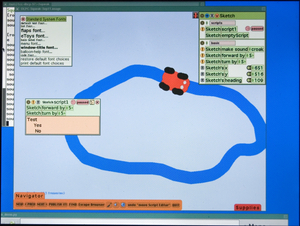
- Liquid-crystal display: 7.5” dual-mode TFT display;
- Viewing area: 152.4 mm × 114.3 mm;
- Two modes: (1) grayscale (B&W) reflective mode (for outdoor use—sunlight-readable); and (2) color backlight Mode (for indoor use);
- reflective mode: high-resolution (200 DPI), 1200(H) × 900(V) grayscale pixels, power consumption 0.1–0.2Watts;
- backlight mode: built in sub-pixel sampling of the high-resolution display results in approximately 800(H) × 600(V) color pixels, power consumption 0.2–1.0Watts;
- The display-controller chip (DCON) with memory that enables the display to remain live with the processor suspended. The DCON also formats data for the display.
- This Liquid-crystal display is the basis of our extremely low power architecture. The XO is usable while the CPU and much of the motherboard is regularly turned off (and on) so quickly that it's imperceptible to the user. Huge power savings are harvested in this way (e.g. by turning stuff on the motherboard off when it's not being used (if even for a few seconds), while keeping the display on).
- Note: web browser images are currently scaled up so that an image of very roughly [800 × 600] fills up the browser window.
Integrated peripherals:
- キーボード: 70+ キー, 1.2mm ストローク; sealed rubber-membrane key-switch assembly
- Keyboard Layouts
- レイアウト画像 (for B3)- US International, Thai, Arabic, Spanish, Brazilian Portuguese, Nigeria, Urdu, French
- カーソルキー: five-key cursor-control pad; 4方向キー+エンターキー
- タッチパッド: アルプス電気 Dual capacitance/resistive touchpad; supports written-input mode
- オーディオ: Analog Devices AD1888, AC97-compatible audio codec; ステレオ, with dual internal speakers; monophonic, with internal microphone and using the Analog Devices SSM2302 for audio amplification
- Wireless: Marvell Libertas 88W8388+88W8015, 802.11b/g 互換; dual adjustable, rotating coaxial antennas; supports diversity reception
- Status indicators: 電源, バッテリ, WiFi; visible lid open or closed
- ビデオカメラ: 640x480 解像度, 30FPS, Omnivision OV7670. The camera and device driver support disabling AGC and automatic color balancing, to enable its use as a photometric sensor for educational applications.
- Independent and undefeatable by software display of microphone and camera recording status
外部コネクタ:
- 電源: 2-pin DC-input, 10 to 20 V usable input. Input can safely handle -40 to 39 V. input. Exceeding this range will likely blow a one-time fuse.
- ライン出力: Standard 3.5mm 3-pin switched stereo audio jack
- マイク: Standard 3.5mm 2-pin switched mono microphone jack; selectable input mode:
- Sensor, DC w. 2.5 V (3K ohm impedance) bias voltage for switches, resistive sensors, etc.
- Sensor, DC w. no bias voltage for measuring voltages (0 - 3 V)
- 外部マイク, AC w. bias voltage
- Expansion: 3 Type-A USB-2.0 コネクタ; MMC/SD カードスロット
- 最大電力: 1 A (トータル)
バッテリ:
- Fully-enclosed “hard” case; user removable
- Pack type: 4 Cells, 6V series configuration
- Two chemistries:
- NIMH, with a capacity of 16.5 Watt-hours
- LiFeP, with a capacity of 22 Watt-hours
- Electronics integrated with pack provide:
- Identification
- Battery charge and capacity information
- Thermal and over-current sensors along with cutoff switch to protect battery
- Cycle life: 最低 2,000回の充電/放電 (to 50% capacity of new, IIRC).
- Power Management will be critical
BIOS/loader:
- Open Firmware が使われています。including hardware initialization and fast resume.
Environmental specifications:
- Temperature: somewhere in between typical laptop requirements and Mil spec; exact values have not been settled
- Humidity: Similar attitude to temperature. When closed, the unit should seal well enough that children walking to and from school need not fear rainstorms or dust.
- Altitude: -15m to 3048m (14.7 to 10.1 psia) (operating), -15m to 12192m (14.7 to 4.4 psia) (non-operating
- Shock: 125g, 2ms, half-sine (operating) 200g, 2ms, half-sine (non-operating)
- Random vibration: 0.75g zero-to-peak, 10Hz to 500Hz, 0.25 oct/min sweep rate (operating); 1.5g zero-to-peak, 10Hz to 500Hz, 0.5 oct/min sweep rate (nonoperating)
- 2mm plastic walls (1.3mm is typical for most systems).
Regulatory requirements:
- The usual US and EU EMI/EMC requirements will be met.
- The laptop and all OLPC-supplied accessories will be fully UL and is RoHS compliant.
ラップトップ開発スケジュール
The XO laptop hardware development schedule has two more test unit builds (Beta Test 3 and Beta Test 4), before a final test build (C Test 1) on the final production line and mass production. The Beta Test 3 build scheduled for early May will be the first one providing the processor and memory capabilities of the production version.
Pre-production Test Systems (CTest-1, or C1)
This build is a very small number (200 or so) of laptops produced as a test of the manufacturing process on the main production line, and should happen in early fall 2007. A C1 laptop is hopefully identical to a production unit in all aspects...
ベータテスト 4 Systems (BTest-4, or B4)
This build, scheduled for the middle of summer 2007, is the final chance to fix hardware and mechanical problems that were detected in the Beta Test 3 build of the XO. Only a small number (200 or so) of these will be built for testing, as the injection molds for the plastic case have to be taken offline and duplicated to prepare for mass production (the Beta Test mold set will be retired after duplication).
このビルドではラップトップに新しい機能は加えません。This build is planned merely to test solutions to problems detected in the BTest-3 laptops.
ベータテスト 3 Systems (BTest-3, or B3)
This build, scheduled for May 2007, is the first to use an updated design for the laptop. Noticeable improvements over BTest-2 include:
- 高速、低消費電力プロセッサにしました: the Geode LX-700
- 64 KB I/64 KB D of L1 Cache, 128 KB of L2 Cache (vs. 32 KB of L1 cache)
- プロセッサとメモリのクロックを速くしました (433/333 vs. 366/266)
- 1.5 W typ. vs. 3 W typ.
- Much better graphics processor, including support for rotated blits and depth conversion
- メモリの増量: 256 MB of SDRAM (vs. 128 MB)
- A new hinge design allows greater tilt of the screen
- ケースのデザインが改良されました (addressing strength and water resistance)
A very small number of BTest-3 units (around a hundred) will be built, all destined for hardware and low level software development.
ベータテスト 2 Systems (BTest-2, or B2)
Approximately 2500 systems were built by Quanta and are being distributed. These are fully functional machines with CaFE ASICs, and reflect some, but not all of the learning and improvements from testing of BTest-1. Much more information about the BTest-2 systems can be found in the BTest-2 Release Notes. Some of the details of the hardware design are to support the OLPC Human Interface Guidelines.
BTest-2 systems are almost identical visually with BTest-1. BTest-3 will have more substantial physical differences. An easy way to tell the difference between BTest-1 and BTest-2 is that BTest-1 keyboards have white lettering, and BTest-2 has black lettering.
ベータテスト 1 Systems (BTest-1)
Approximately 875 systems were built by Quanta and were distributed. These are fully functional machines, but built before the rigorous testing that will now take place. Much more information about the BTest-1 systems can be found in the BTest-1 Release Notes.
Pre-BTest boards
A small number of pre-BTest boards were built in preparation for building complete BTest systems. Developer information about B-test boards are here.
アルファテスト Prototype Electronics
Power up of the first OLPC electronics prototype boards occurred April 15, 2006. Power and ground testing continued over the weekend, and formal debug and BIOS bring up started Monday, April 17, 2006 at Quanta Computer's labs in Taipei, Taiwan. By Wednesday, April 19, Linux was booting on the first generation prototypes.
Photographs:
- Component side OLPC circuit board
- Back side of the OLPC circuit board
- Picture of Linux running with circuit board in the lab
- Picture of the screen of Linux running on the OLPC circuit board; fittingly, it shows a Chinese desktop
See also
Environmental Impact
Hardware
Formerly part of this page:
Hardware uniqueness
Hardware design
School Server Hardware
While the laptop is rightfully at the center of OLPC, a valuable peripheral is the school server. OLPC will be building and distributing school servers along with the laptops, to extend the storage and computation provided by each laptop, as well as providing a local library and a mesh portal to the Internet.
Unlike the laptop, the school server is more of a collection of services than a hardware platform. In a manner identical to the laptop, OLPC will collaborate with manufacturing partners to provide a cost-efficient hardware platform for running the recommended software. Unlike the laptop, the manufacturing collaboration will not be exclusive. Individual countries will be free (even encouraged) to design and manufacture their own school servers running derivatives of the OLPC school server software.
XS
This will be the school server built for OLPC by Quanta. It is still in the very early stages of design, but should reach early production volumes in late fall. See the specification.
XSX
This is a prototype school server, built for early school trials in country. It will be integrated from off-the-shelf components, and will be overpowered compared to a production school server in order to simplify early demands for system software. See the specification and the implementation.
